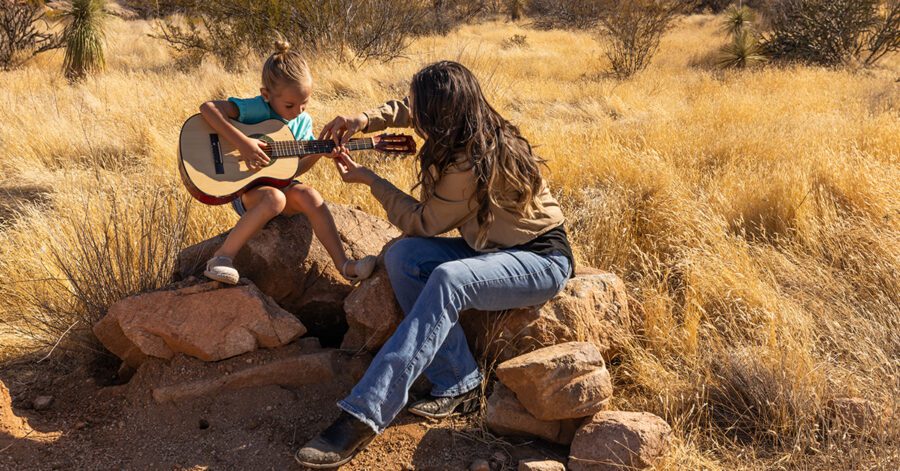We value music in classical education because it reveals God’s creative nature and provides a pathway for children to worship their Creator through learning. For Christian homeschool families seeking meaningful music for homeschoolers, the challenge lies in finding resources that go beyond entertainment to cultivate both musical excellence and spiritual formation.
Many parents struggle to move past simple children’s songs toward a curriculum that honors God’s design for music as worship. In this article, Emily Martin, a homeschool mom and Academic Advisor, helps parents infuse music and worship into their homeschool routines by understanding that God himself is the ultimate composer—the One who set “the morning stars” singing at creation’s dawn. Classical Conversations has developed this integration over decades, creating a pathway where tin whistle lessons and music theory become acts of worship.
Music as a Lifelong Companion
From the moment children are born, they are surrounded by music. Moms of newborns are advised to play classical music for their babies because it is believed to encourage brain development. I was even told it would make my baby a genius to play Beethoven while he took his naps. New moms cradle their tiny infants and sing lullabies as they rock them to sleep.
As the growing toddler starts to interact with the world around them, it seems as though every single toy plays music. These colorful toys with their flashing lights sing the ABCs and popular children’s songs that we all seem to know. Eventually, the child grows older and develops their own taste in music, while we adults tend to remain nostalgic about the classics from our teenage years.
As we ponder the relationship between music and our children, it seems as though music is like a lifelong friend that grows up with us and understands us like no one else does. We turn on music when we are happy, we play a sad song when we need to cry, we turn on something soothing when we want to relax, and we play our favorite church hymns when we want to draw closer to God. As humans, God created us with the ability to create music, appreciate music, and use music to praise Him and tell of His beauty and goodness.
Homeschool Dad Discussion-Enjoying Music Together
God as the Original Creator of Music
Music has been present since before time began. In the book of Job, God tells Job that “the morning stars sang together” (Job 38:7) when the cornerstones of the Earth were laid. All things that are created by God can sing. Scientists have determined that all things in nature have a vibration and frequency. Most of these frequencies we can’t hear, but their sound is emitted into the world. God created all things to sing, to make a beautiful sound, and to reflect His beauty in the world.
As humans, we know that God created us to sing, so that we can proclaim His beauty and goodness to others. But God didn’t only design humans to create music with our voices; he also gave us the unique ability to play music with instruments. The Psalmist of 33:3 says, “Sing to him a new song; play skillfully on the strings, with loud shouts” (ESV). Throughout Scripture, we read countless mentions of people playing instruments as a way of worship, celebration, and ministry.
Interestingly, we see the first mention of musical instruments all the way back in Genesis 4:21. Jubal, a descendant of Adam, is known as “the father of all those who play the lyre and pipe” (NASV). God equipped us with the ability to play instruments as an additional means to express His beauty and goodness.
How Classical Music Education Builds Faith
When walking into any Classical Conversations community around the world, the sounds of music permeate the hallways. Music is the vehicle by which our students learn through our homeschool music curriculum. The students sing songs about history, Latin, geography, science, grammar, and math. This classical homeschool music integration transforms learning from mere memorization into worship.
In addition to singing, our students learn how to play an instrument. We lead the students through music theory and how to apply that theory practically, through playing the tin whistle. This lays the groundwork for them to be able to create their own music at home and learn to play other instruments as they grow older. Perhaps the five-year-old learning to play the tin whistle will one day become a worship minister at his church, using these early foundations in music for homeschoolers to serve God’s kingdom.
Homeschool Music: A House of Worship
Music and Worship in Classical Conversations
So often, we use music to set the mood we wish to convey. When sitting in a worship service, the music minister may select songs to lift our spirits and create a mood of joy and thanksgiving. He may select songs that guide us into a time of reflection and prayer. We can appreciate the tempo to grow our excitement, or to lead us into a time of quiet worship. We can appreciate the melody of the piece and the harmony of the instruments.
As the sound of the music carries us into a time of worship, we can reflect on the idea that God gave us the ability to perceive music to appreciate His beauty and goodness. Music is an amazing gift that God gave us. As we meditate in worship, music can help us shift our mood and set our minds to be closer to Him. This connection between music and worship CC emphasizes makes every learning moment an opportunity for spiritual formation.
Developing Musical Appreciation Through Classical Education
Music appreciation is something that must be nurtured through intentional classical music education. In Classical Conversations, we take the time to ensure our students understand music. During the third quarter of the academic year, our Foundations students listen to classical music. Tutors lead them through famous classical pieces, listening for specific instruments, patterns, crescendos, and tempo.
The students may talk about what kind of mood was set as they listened to the piece and what the music made them think about. These types of conversations arise because we can appreciate music in a way that no other living being can.
This practice is repeated in Challenge II so that in Challenge III, the students are equipped to analyze scores of music to appreciate music from a technical perspective. Math in Motion helps students learn the language of music through music theory. The Gift of Music offers insights into the lives and contributions of great composers. The students learn that God created music with precision and beauty. He created us to understand and appreciate that precision and beauty.
Is Musical Literacy Important?
Home Schooling Music as an Act of Worship
Why did God create us to sing, play, and appreciate music? To praise Him! “Praise him with trumpet sound; praise him with lute and harp! Praise him with tambourine and dance; praise him with strings and pipe! Praise him with sounding cymbals; praise him with loud clashing cymbals! Let everything that has breath praise the Lord! Praise the Lord!” Psalm 150:3-6 (NASV).
God created the trees, the birds, and the insects to sing songs of praise. Have you ever gone outside to experience peace and quiet? It isn’t so peaceful and quiet, is it? The trees rustle in the wind, creating a lovely percussion rhythm, the cicadas sing their songs to one another, and the birds lift their voices for the world to hear. God created everything to sing His praises, especially humans.
Teaching Children Worshipful Music in the Homeschool
We are called to lift our voices and praise God. People sang praises to God throughout the Bible. We can read the songs of prayer from Moses, David, Solomon, and Mary. Even the disciples sang a song after the Last Supper with Jesus. Some of these occasions were mournful, but they were always songs of praise to God. We read in Scripture that even the angels sing their praises to God.
I’m in awe at the idea that we praise God in the same way the angels praise Him, who are worshipping at His feet. God created music and our ability to create it and appreciate it for one reason, and that is to worship him. When we incorporate worshipful music homeschool practices, we’re joining this eternal chorus of praise. As we teach our children about music, let us not forget to teach them that God created it for His praise.
Practical Ways to Integrate Classical Music Into Your Homeschool
- Make classical music the only background music during school time
- Start each day with hymn singing to establish a worship atmosphere
- Use Classical Music for Dummies to study the composers highlighted throughout the Fine Arts Orchestra section of Foundations, listening to key pieces while learning about their historical context
- Practice conducting while listening to orchestral pieces
- Keep nature notebooks where children draw what they hear in classical pieces
- Begin practice time with prayer to consecrate musical learning as worship
- Study hymn writers and their stories to understand how faith and music intersect throughout Christian history
Classical Education in Music: Student Success Stories
Finding God in Music Through Homeschooling
How do we see God in music? God created music. He created all things to praise Him with their voices and their songs. We should count it as a joy and honor to be counted among those who can create music, appreciate music, and praise God with music, and to use music to tell of His beauty and goodness.
When we embrace homeschooling with the classics, we’re not simply teaching musical theory or historical facts about composers. We’re inviting our children to participate in the same creative expression that flows from the heart of God himself. Through finding God in music, our students discover that every note, every rhythm, and every harmony reflects the order and beauty of their Creator.





